OIE Mentor Supports Innovators’ Growth and Potential
Office of Innovation and Entrepreneurship 2025 James “Chip” Hanlon Volunteer Mentor of the Year:... Read more
Office of Innovation and Entrepreneurship 2025 James “Chip” Hanlon Volunteer Mentor of the Year:... Read more
Celebration of Innovation and Entrepreneurship 2025 Regional Business of the Year-- Sarris Candies Sarris Candies, a... Read more
Posted on by Mike Yeomans
Several Pitt innovators and startups took center stage as leaders of Pittsburgh’s rapidly expanding AI sector convened in the heart of the city’s innovation corridor at Bakery Square to map out Pittsburgh’s strategy to earn a leading role in the rapidly evolving AI revolution.
And in a standout moment to cap off the AI Horizons Conference, Pitt startup Surface Design Solutions earned the first-place $100,000 prize in a pitch competition during the three-day event.
At the event panel titled “AI in Medicine: Accelerating Drug Discovery and Cures” Hooman Rashidi, Pitt’s Associate Dean of AI in Medicine and executive director of the CPACE (Computational Pathology & AI Center of Excellence) was joined by Jonathan Steckbeck, CEO of Pitt startup Peptilogics, and Molly Johnson, senior director of data sciences at Pitt startup Avista Therapeutics to demonstrate how Pitt innovators are harnessing AI to build powerful platforms for disease diagnosis and drug discovery.
Rashidi explained that his focus at CPACE is on using synthetic data to accelerate disease diagnosis, which complements the work of companies like Avista and Peptilogics, which are developing therapies for genetic retinal diseases and device-related infections, respectively.
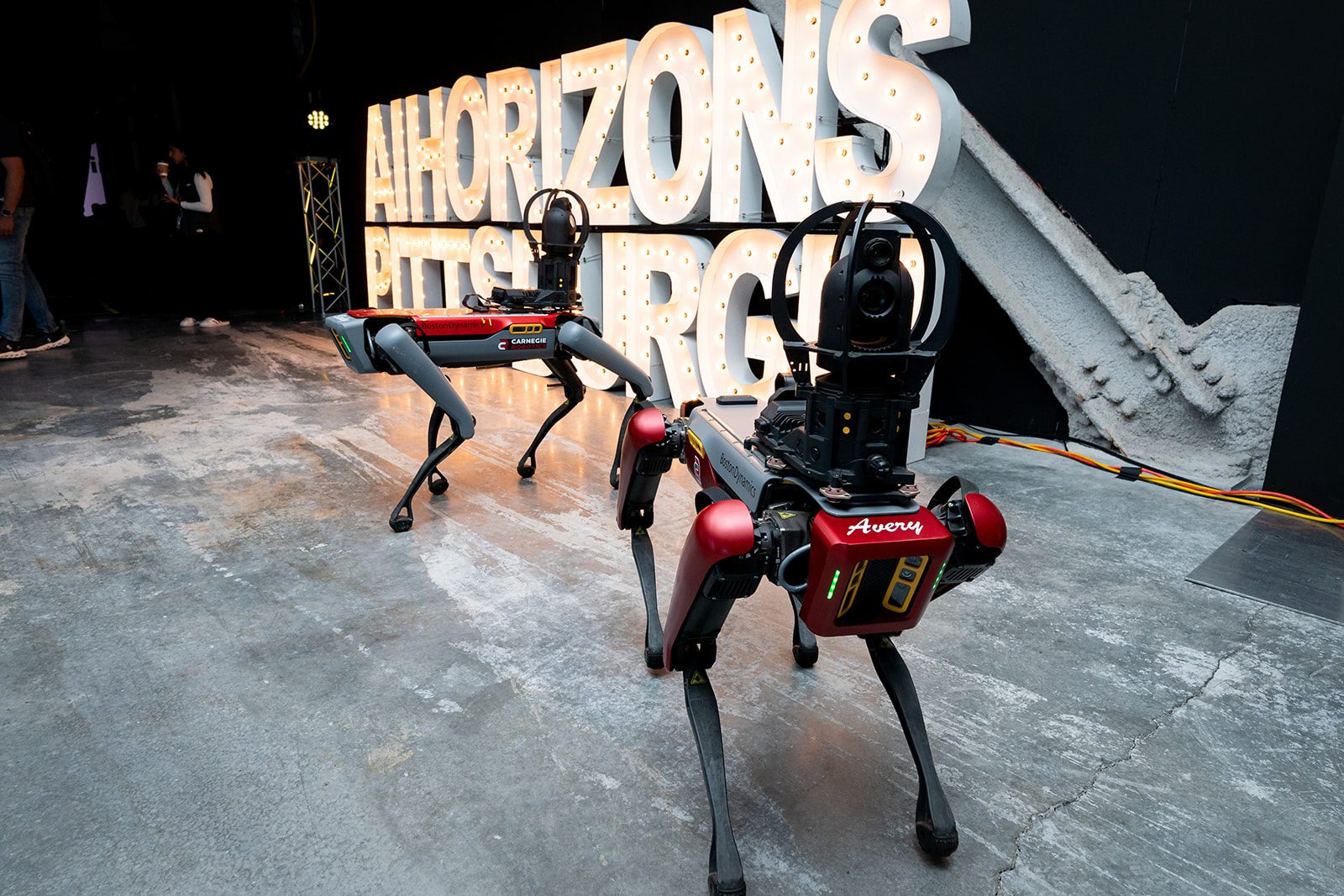
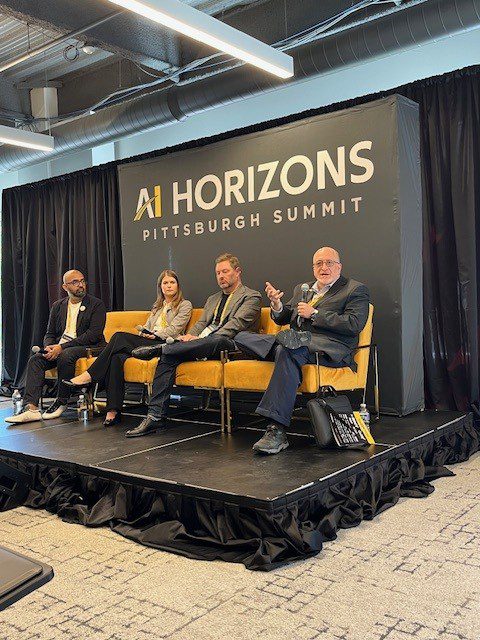
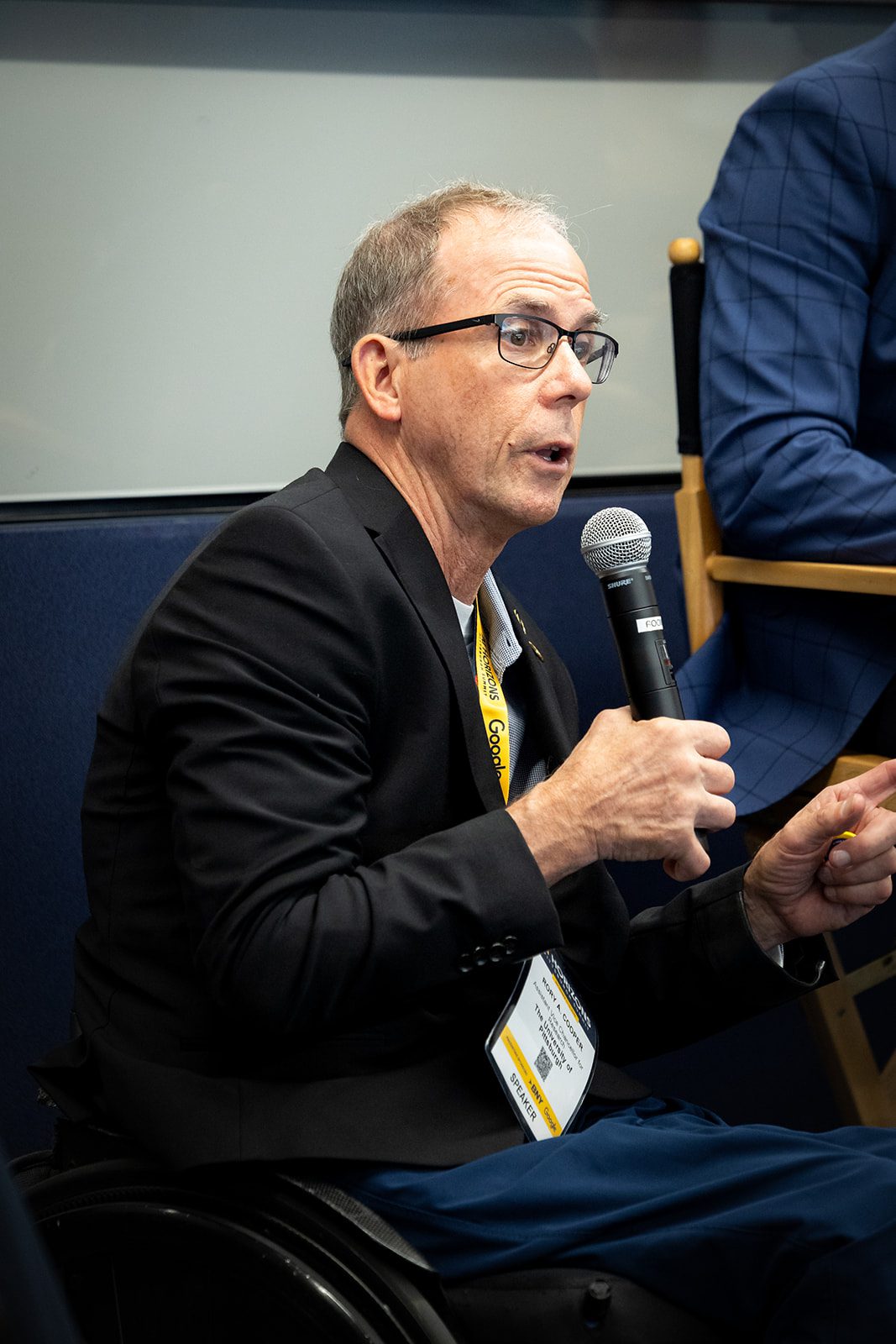
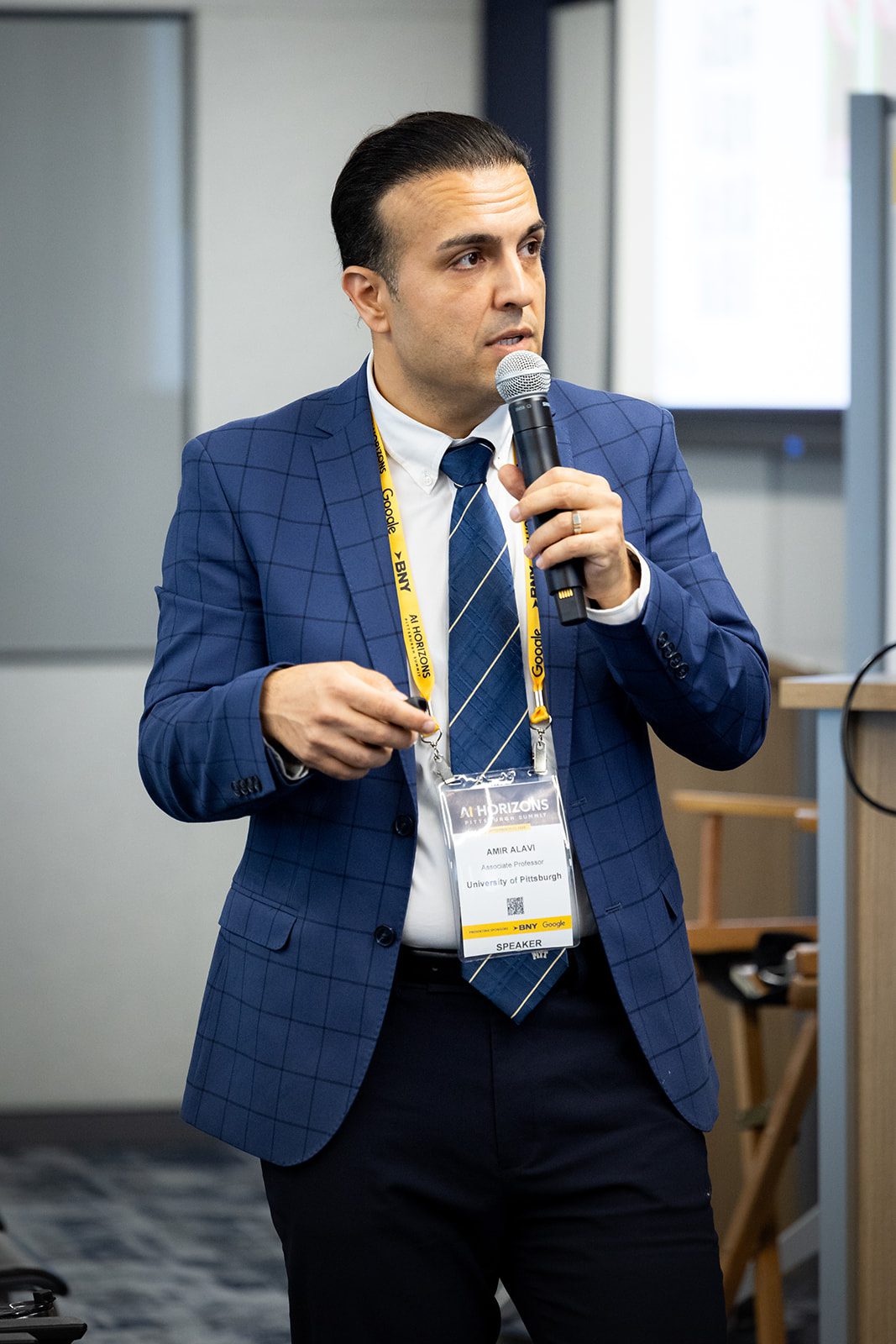
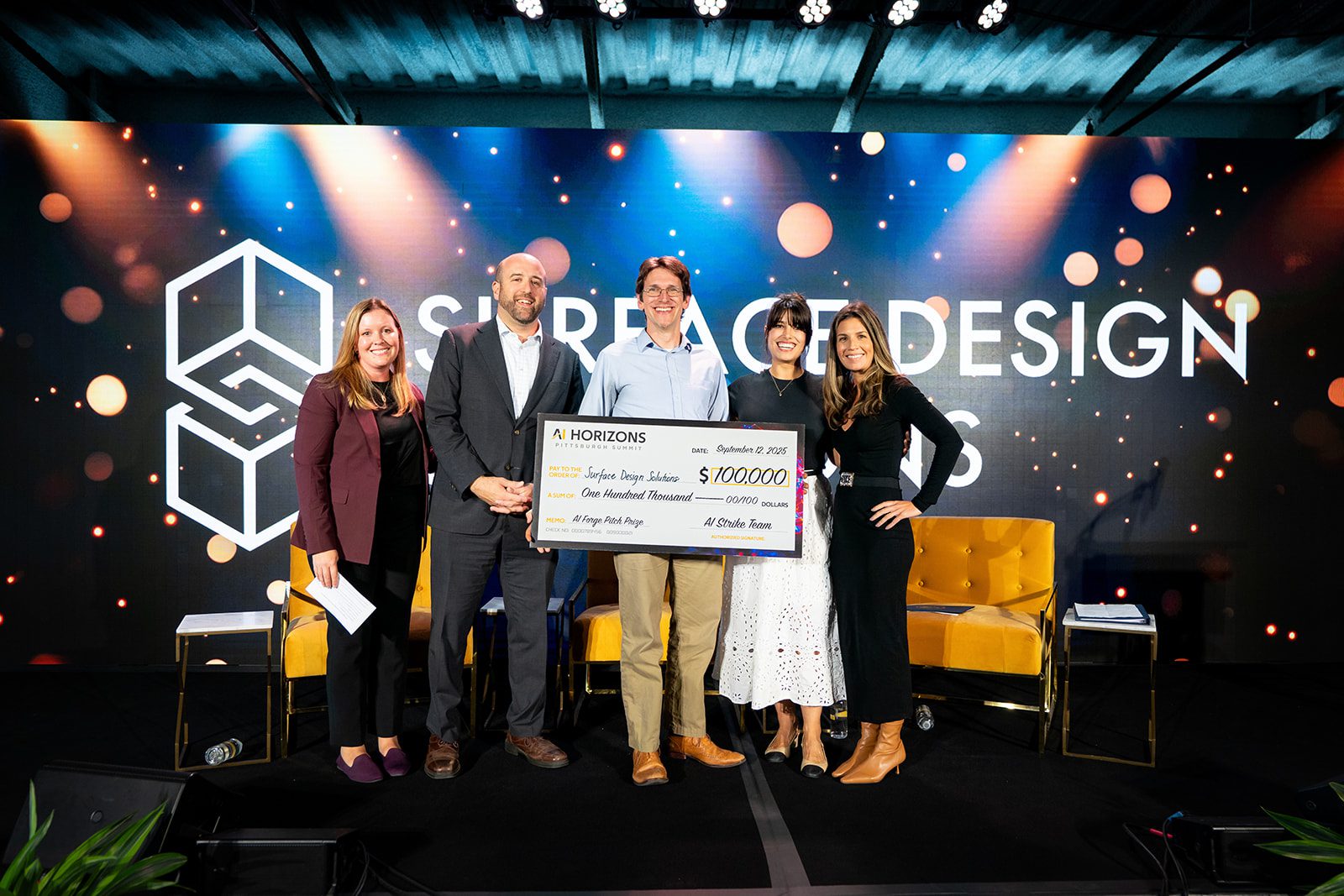
“If you don’t have the right diagnosis, the right targets to tackle, you won’t be able to provide the best care,” he said.
Rashidi said Pitt’s strength in AI is knowing where it can add value. Earlier this year, the University of Pittsburgh announced a 5-year, $10 million partnership with the Fortune 500 technology, engineering, and consulting company Leidos to collaborate with CPACE on building and disseminating AI-powered tools for more rapid disease diagnosis.
“We know what we know best. We don’t have the same resources as Microsoft or OpenAI. Our strategy is to determine when it makes sense to have a vendor partner and when to create our home-brewed solutions,” Rashidi said.
He said closed-source AI engines like Gemini and ChatGPT, while powerful, also have limitations, especially when it comes to details of cutting-edge subspecialty scientific disciplines.
He said CPACE is developing some of its own AI models and tools, such as Nebulon-GPT and Pitt-GPT-Plus, which he said do not rely on the power-hungry closed-source platforms, but rather can run “100 percent locally on your laptop (based on several open-sourced models) at a fraction of the cost in terms of energy usage while enhancing privacy.”
Steckbeck followed up on Rashidi’s theme, saying that there is no way to “brute force” the way to better results in the realm of biology simply by collecting more data.
“The complexity of biology is such that you simply can’t collect enough data. The question is how to take the data you have and make it useful,” he said.
Peptilogics has received FDA Fast Track and Qualified Infectious Disease Product designations to advance its lead drug candidate after a successful Phase I safety trial for patients undergoing knee replacement surgery to treat and prevent infection.
“We have an asset that is getting toward the end of clinical development,” Steckbeck said, which is positive, but added that the company’s long-term success hinges on using the new AI and machine learning tools to build a platform for treating other conditions, allowing the company to scale more broadly.
Steckbeck said his company is positioned perfectly to do so in Pittsburgh, due to its unique intersection of world-class universities and world-class medical centers.
“Few places in the world bring together this kind of talent, resources, and capabilities,” he said.
Molly Johnson from Avista said that her company is using AI tools to “learn across experiments” so that they don’t have to start from square one each time they pursue a new therapeutic target.
Avista’s scientists optimize viral vectors to deliver therapeutic genes targeted to specific retinal cells. The company is conducting several preclinical studies for its gene therapies for rare inherited retinal diseases, including a partnership with pharma giant Roche AG.
“We’re really focused on optimizing the delivery system of the gene, which is the virus itself, and trying to get that as targeted to the cell types affected by disease as much as possible while limiting off-target effects,” she said. “Understanding the nitty-gritty nature of that data is very important for machine learning training. We have found that well-curated, diverse, smaller data sets are much more beneficial to us. They don’t need to be super expensive or difficult to produce.”
At a concurrent AI Horizons panel titled “AI Transforming Veteran and Military Medicine,” two Pitt innovators outlined how machine learning is fueling innovations in their labs for veterans and those in need of assistive technologies.
Rory Cooper, founding director of the University of Pittsburgh Human Engineering Research Laboratories (HERL), a Veterans Affairs Rehabilitation R&D Center, detailed HERL’s efforts to incorporate machine learning technology to inspire new portable and lighter-weight wheelchair designs, as well as provide assistive robotic wheelchair controls.
“AI can accelerate design, create virtual twins for testing new scenarios and predicting behaviors, and enhance learning beyond clinical settings,” he said.
Amir Alavi, associate professor of civil and environmental engineering at Pitt’s Swanson School of Engineering, has been developing advanced functional materials with applications ranging from miniature medical implants to large-scale civil infrastructure. His work explores how AI, and in particular generative AI, can accelerate the discovery of new forms of such materials. “We are using Generative AI to accelerate the design of patient-specific implants and prosthetics for veterans, reducing timelines from months to days,” he said. “Those same methods can be extended to mission-specific structures for the military, such as deployable bridges and protective barriers.”
Closing out the conference, Pitt startup Surface Design Solutions was announced as the winner of a pitch competition that kicked off the conference. The company, led by Tevis Jacobs, professor in the Department of Mechanical and Materials Science at the Swanson School of Engineering, was named the 2024 Startup of the Year by the Office of Innovation and Entrepreneurship.
Jacobs recently began a one-year leave from his faculty position to focus on his company, which is building a machine learning platform that delivers physics-informed analysis of surface conditions for manufacturers of products ranging from medical devices to powdered metal industrial components to flooring to shoes.
The company also recently received a $365,000 grant from the R.K. Mellon Foundation to help scale its growth into new industry verticals.
“We have seen an exponential jump in new technologies disclosed to our Innovation Institute that incorporate AI, and new companies that are being spun out of the university that are built around proprietary machine learning platforms,” said Evan Facher, Pitt’s Vice Chancellor for Innovation and Entrepreneurship and Associate Dean of Commercial Translation at the School of Medicine. “This is a trend that will certainly continue as our faculty and students embrace these powerful new tools to make a societal impact.”
Netramind
AI-powered ophthalmic disease detection/analysis to diagnose and predict the progression of macular degeneration and other eye diseases https://www.innovation.pitt.edu/pitts-newest-ai-powered-startup-gets-big-boost-from-local-foundations/
AI-powered platform for detecting and managing abdominal aortic aneurysms
Medical software app for diagnosing ear infections
Personalized Pain Treatment LLC
Machine learning platform for predicting patients’ responses to different pain treatments